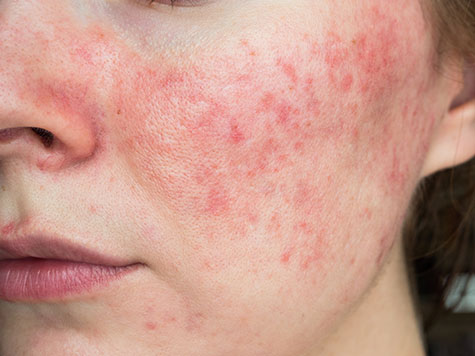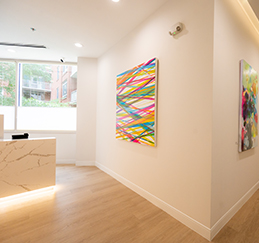What Causes Rosacea?

A specific cause of rosacea has not been identified, but several factors appear to contribute to this condition. These causes include:
-
- Genetics
-
- Subtle imbalances of the immune system
-
- An overabundance of a common mite (Demodex) that is found on the skin
-
- Improper skin care routine
-
- Side effects from medications (ex. topical steroids)
Further research is necessary to determine an exact cause for rosacea, but regardless of the cause, treatments are available.
What Types of Rosacea Are There?
There are four subtypes of rosacea. They are:
-
- Erythematotelangiectatic rosacea, which causes redness, flushing, and visible blood vessels, typically across the cheeks and nose. These skin findings can also appear on the chin and forehead
-
- Papulopustular rosacea, which consists of acne-like breakouts (papules or pustules) typically on the midface
-
- Phymatous rosacea, which manifests as thickened and shiny skin with an uneven texture
-
- Ocular rosacea, which typically results in irritation and redness in the eyes and surrounding eyelids
Who Gets Rosacea?
Rosacea is very common. You may be more susceptible to rosacea if you fall into the following categories:
-
- Fair skin, especially with blonde hair and blue eyes
-
- Between the ages of 30-60
-
- Celtic or Scandinavian ancestry
-
- Family members with rosacea or severe acne
While people who fall into these categories are more likely to experience rosacea, any individual regardless of age, ancestry, or race may still develop rosacea.
Why Treat Rosacea?
It’s important to treat rosacea because it is possible to develop more severe symptoms and skin findings over time. For example, those with rosacea may develop thick, bumpy, or rough skin, which can be more difficult to treat as time progresses. This can lead to a condition known as rhinophyma, in which the oil glands on the nose are enlarged, causing the nose to become extremely red or purple and distorting the nose to an enlarged, disproportionate shape.
Additionally, at any stage, rosacea can also cause discomfort, so it is important to seek care from a board-certified dermatologist to address and relieve these symptoms. Finally, it is important to be evaluated by a board-certified dermatologist to rule out any other conditions which can mimic rosacea or potentially be more serious than rosacea. These can range from common conditions such as acne or skin infection to more rare conditions such as lupus or even skin cancer.
How Can I Prevent Rosacea?
Often, those with rosacea experiences flares due to various triggers. Some common triggers include:
-
- Overheating
-
- Cold wind
-
- Spicy foods
-
- Stress
-
- Makeup, improper skin care, or irritating personal care products
-
- Certain medications
Over time, you will likely begin to narrow down a list of triggers that affect your rosacea and can avoid them as much as possible. At Arlington Dermatology we can also help you identify your specific rosacea triggers along with your personalized treatment plan.
How Can I Treat Rosacea?

After determining your triggers and helping educate you on how to avoid them, your dermatologist will work with you to develop an effective at-home skincare routine to minimize your rosacea symptoms. Treatment depends on your unique symptoms and skin findings, and we will find a treatment plan customized to suit your unique needs. Your dermatologist may suggest:
-
- Laser or light therapy such as IPL to reduce redness or vascular issues
-
- Topical Brimonidine or oxymetazoline
-
- Topical azelaic acid
-
- Topical ivermectin (Soolantra)
-
- Topical antibiotics
-
- Oral antibiotics
-
- Isotretinoin (Accutane)

Schedule an Appointment
Whether you have recently developed subtle redness on your face or have dealt with rosacea for years and have more severe symptoms, the board-certified dermatologists at Arlington Dermatology can help with an individually tailored and effective treatment plan.
To schedule your appointment at Arlington Dermatology, please call our office or request an appointment online.
Rosacea FAQs
Does rosacea go away?Rosacea is a chronic condition that cannot be fully cured or resolved on its own but is treatable. Does stress cause rosacea?Stress is a common trigger for rosacea flare-ups. Is rosacea bacterial?Rosacea is not primarily caused by bacteria, but certain types and overabundance of bacteria may play a role in its development or exacerbation. An increase in the concentration of certain organisms (such as Demodex mites or helicobacter pylori bacteria) on the skin or in the gut has been linked as a contributor to the development of rosacea, but not as the sole cause. What is the main cause of rosacea?The main causes of rosacea include: genetics, abnormalities in the blood vessels, imbalances of the immune system, and environmental & microbial factors. What products do dermatologists recommend for rosacea?Common products/medications that dermatologists recommend: Topical azelaic acid, Topical ivermectin (Soolantra), Topical & oral antibiotics, Gentle cleansers & moisturizers, Anti-inflammatory products (Niacinamide, sulfacetamide, colloidal oatmeal, etc…), and Sunscreen! Can I get rosacea on my arms?Rosacea mainly affects the face. However, in rare cases, some individuals may experience rosacea-like symptoms on other areas other than the face, like the neck or upper chest. Should you moisturize rosacea?Absolutely! Be sure to use a gentle, non-irritating moisturizer on a daily basis. |


